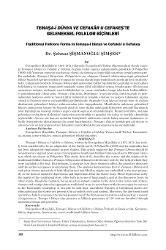| dc.contributor.author | Şişmanoğlu Şimşek, Şehnaz | |
| dc.date.accessioned | 2019-06-28T11:10:48Z | |
| dc.date.available | 2019-06-28T11:10:48Z | |
| dc.date.issued | 2016 | |
| dc.identifier.issn | 1300-3984 | en_US |
| dc.identifier.uri | https://hdl.handle.net/20.500.12469/1308 | |
| dc.description.abstract | Temaşa-i Dünya ve Cefakâr u Cefakeş written by Evangelinos Misailidis in 1871-1872 has widely been considered to be an adaptation of the Greek novel O Polipathis (1839) and its originality has not been adequately emphasized in past studies. This article suggests that Temaşa-i Dünya should be considered an original novel since it incorporates traditional folklore forms peculiar to Ottoman literature which are absent in Polipathis. This study first of all describes the variety and the origins of the traditional folklore forms in Temaşa-i Dünya and delineates the literary tools by the help of which they were included in the text. Furthermore it analyzes how these elements affect the narrative discourse and the author’s purposes in employing them. The analysis demonstrates that in Temaşa-i Dünya oral and print culture materials of both Muslim and non-Muslim origins are embedded in the text primarily in the form of narrative digressions and digressions from the frame story. These digressions carry the marks of the traditional story teller both in terms of functionality and at the discursive level. In other words Misailidis’ narrator being an active subject similar to the story teller in the oral culture chooses and manipulates the appropriate traditional story in accordance with the messages he conveys to the Karamanli readership. It can also be said that unrealistic features of traditional stories are eliminated and the stories are presented in a realistic style and content. Moreover the aforementioned narratives help to overcome the limited perspective of the first person narrative and to portray a variety of experiences. Temaşa-i Dünya also presents a folkloric panorama of 19th century Istanbul through numerous idioms and proverbs. | en_US] |
| dc.language.iso | tur | en_US |
| dc.publisher | Milli Folklor Dergisi | en_US |
| dc.rights | info:eu-repo/semantics/openAccess | en_US |
| dc.subject | Degression | en_US |
| dc.subject | Evangelinos Misailidis | en_US |
| dc.subject | Frame Story | en_US |
| dc.subject | Karamanlidika | en_US |
| dc.subject | Novel | en_US |
| dc.subject | Temaşa-i Dünya ve Cefakar-u Cefakeş Turkish in Greek Script | en_US |
| dc.subject | Traditional Folklore Forms | en_US |
| dc.title | Traditional Folklore Forms in Temaşa-i Dünya ve Cefakar-u Cefakeş [Temaşa-i Dünya ve Cefakar-u Cefakeş´te Geleneksel Folklor Biçimleri] | en_US |
| dc.type | article | en_US |
| dc.identifier.startpage | 86 | en_US |
| dc.identifier.endpage | 99 | |
| dc.relation.journal | Milli Folklor | en_US |
| dc.identifier.issue | 110 | |
| dc.identifier.volume | 2016 | en_US |
| dc.department | Fakülteler, İşletme Fakültesi, İşletme Bölümü | en_US |
| dc.institutionauthor | Şişmanoğlu Şimşek, Şehnaz | en_US |
| dc.relation.publicationcategory | Makale - Uluslararası Hakemli Dergi - Kurum Öğretim Elemanı | en_US |
















